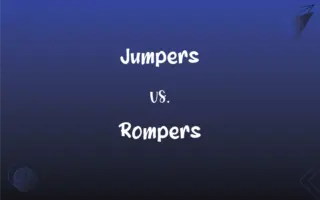ZFS vs. UFS: What's the Difference?
Edited by Aimie Carlson || By Harlon Moss || Published on February 9, 2024
ZFS (Zettabyte File System) is an advanced file system with high storage capacity and data integrity features. UFS (Unix File System) is an older file system, standard in UNIX systems.

Key Differences
ZFS, or Zettabyte File System, is known for its high capacity (up to a zettabyte) and advanced features like snapshot and replication. UFS, the Unix File System, is a traditional file system used in UNIX and its variants, with a simpler design and lower storage capacity compared to ZFS.
ZFS offers advanced data integrity measures, such as checksums for all data and metadata, and self-healing capabilities. In contrast, UFS has basic data integrity features and lacks the robust error-checking and self-healing capabilities of ZFS.
ZFS supports features like storage pools, dynamic disk striping, and continuous integrity checking, enhancing both performance and data safety. UFS, on the other hand, is a more straightforward file system without these advanced storage and performance management features.
Developed by Sun Microsystems, ZFS is designed for scalability and data protection, suitable for large-scale storage environments. UFS, developed earlier, was designed for reliability and simplicity, but with limited scalability compared to ZFS.
ZFS integrates volume management, allowing file systems to grow and shrink dynamically. UFS operates with fixed-size partitions and lacks the integrated volume management capabilities of ZFS.
ADVERTISEMENT
Comparison Chart
Storage Capacity
Up to a zettabyte
Lower compared to ZFS
Data Integrity Features
Advanced, with checksums and self-healing
Basic integrity features
Performance Management
Dynamic disk striping, storage pools
Simpler, without advanced performance features
Scalability
Highly scalable for large environments
Limited scalability
Volume Management
Integrated volume management
Fixed-size partitions, no integrated management
ADVERTISEMENT
ZFS and UFS Definitions
ZFS
A high-capacity file system with advanced data protection features.
The data center opted for ZFS due to its superior data integrity capabilities.
UFS
Operates with fixed-size partitions, typical in older systems.
Managing disk space was challenging due to UFS's fixed partition sizes.
ZFS
Supports snapshots and replication for data backup and recovery.
They utilized ZFS snapshots for efficient, regular backups of the database.
UFS
A traditional file system used in UNIX-based operating systems.
They installed a legacy application on a server running UFS.
ZFS
A scalable file system ideal for large-scale storage solutions.
ZFS was chosen for the enterprise's storage upgrade due to its scalability.
UFS
Lacks the advanced features of modern file systems like ZFS.
They migrated from UFS to ZFS to leverage advanced data integrity features.
ZFS
Known for its self-healing properties and error-checking mechanisms.
The resilience of ZFS helped prevent data corruption during system failures.
UFS
Suitable for systems where simplicity and traditional structure are prioritized
The university's older UNIX servers still use UFS for compatibility.
ZFS
A file system offering storage pools and continuous integrity checking.
ZFS allowed them to manage storage more efficiently with dynamic striping.
UFS
A simpler file system design focusing on reliability.
UFS was preferred for its straightforward and reliable file management.
FAQs
Can ZFS handle large data volumes?
Yes, ZFS is designed for very large storage capacities.
What makes ZFS unique in terms of data integrity?
Its use of checksums and self-healing capabilities.
What is the primary use of UFS?
As a file system for UNIX-based operating systems.
Is ZFS suitable for enterprise storage solutions?
Yes, due to its scalability and advanced features.
What does ZFS stand for?
Zettabyte File System.
Is UFS easier to manage than ZFS?
UFS is simpler but lacks the dynamic management capabilities of ZFS.
Does UFS provide any form of data recovery like ZFS?
UFS lacks the advanced data recovery features of ZFS.
Is UFS still widely used?
It's less common now, with more advanced file systems available.
Does UFS support snapshots like ZFS?
No, UFS lacks advanced features like snapshots.
Can I use ZFS on a UNIX system?
ZFS is available on some UNIX-like systems, including Solaris and FreeBSD.
What are the limitations of UFS compared to ZFS?
UFS has lower capacity, fixed-size partitions, and lacks advanced data protection.
Can ZFS be used for small-scale storage needs?
Yes, but its advanced features are more beneficial for larger scales.
Can ZFS be integrated with cloud storage solutions?
Yes, ZFS can be used in conjunction with cloud and networked storage.
Can UFS handle data corruption as effectively as ZFS?
UFS is less effective at handling data corruption compared to ZFS.
How do user permissions work in UFS compared to ZFS?
Both use UNIX file permissions, but ZFS also includes ACLs for finer control.
Does ZFS offer better performance than UFS?
Yes, ZFS offers dynamic striping and storage pools for improved performance.
Is ZFS a good choice for backup and replication?
Yes, its snapshot and replication features make it ideal for backups.
What is the future outlook for UFS in modern computing?
With advancements in file system technology, UFS usage is declining in favor of more modern systems like ZFS.
Is ZFS compatible with all operating systems?
No, its compatibility is limited to certain UNIX-like systems.
Are there any specific hardware requirements for ZFS?
ZFS can benefit from more RAM and modern CPU architectures.
About Author
Written by
Harlon MossHarlon is a seasoned quality moderator and accomplished content writer for Difference Wiki. An alumnus of the prestigious University of California, he earned his degree in Computer Science. Leveraging his academic background, Harlon brings a meticulous and informed perspective to his work, ensuring content accuracy and excellence.
Edited by
Aimie CarlsonAimie Carlson, holding a master's degree in English literature, is a fervent English language enthusiast. She lends her writing talents to Difference Wiki, a prominent website that specializes in comparisons, offering readers insightful analyses that both captivate and inform.







































































